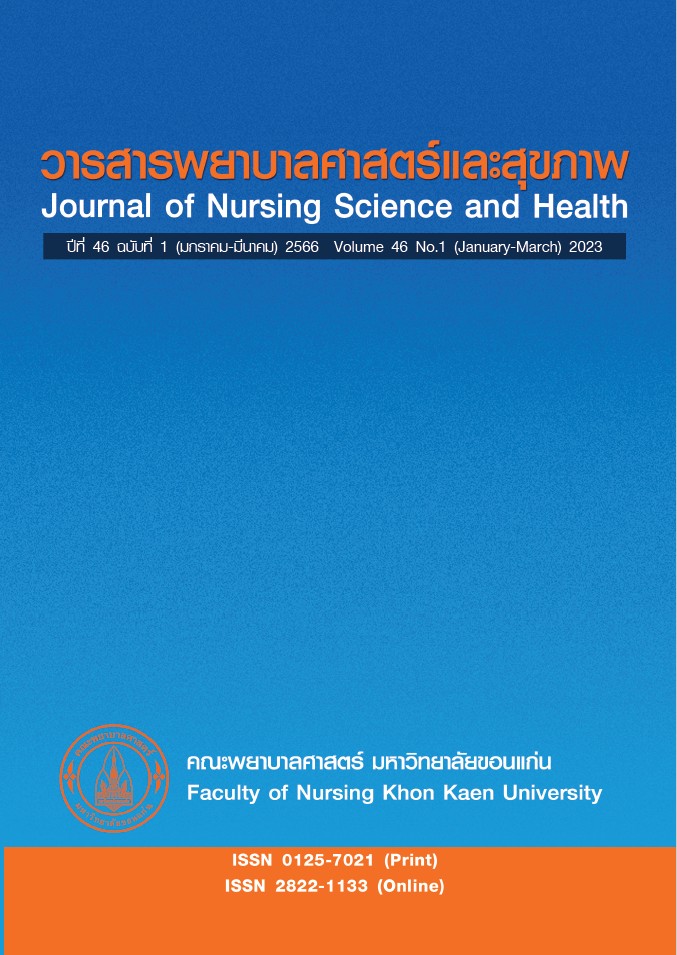การรับรู้สมรรถนะด้านการดูแลแบบประคับประคองของพยาบาลผู้สำเร็จการอบรม หลักสูตรการพยาบาลเฉพาะทาง ด้านการพยาบาลผู้ป่วยแบบประคับประคอง คณะพยาบาลศาสตร์ มหาวิทยาลัยขอนแก่น
คำสำคัญ:
palliative care nursing, perceived competency, professional nurses, short course trainingบทคัดย่อ
การวิจัยเชิงพรรณนาครั้งนี้ มีวัตถุประสงค์เพื่อ 1) ศึกษาการรับรู้สมรรถนะด้านการพยาบาลแบบประคับประคองของผู้สำเร็จการอบรมหลักสูตรการพยาบาลเฉพาะทาง ด้านการพยาบาลผู้ป่วยแบบประคับประคอง คณะพยาบาลศาสตร์ มหาวิทยาลัยขอนแก่น ของผู้สำเร็จการอบรมและผู้บังคับบัญชา 2) เปรียบเทียบการรับรู้สมรรถนะการพยาบาลแบบประคับประคองหลังสำเร็จการอบรมระหว่างผู้สำเร็จการอบรมและผู้บังคับบัญชา และ 3) เปรียบเทียบการรับรู้สมรรถนะการพยาบาลแบบประคับประคองของผู้สำเร็จการอบรมก่อนและหลังการอบรม กลุ่มตัวอย่างที่ศึกษาเป็นพยาบาลวิชาชีพที่สำเร็จการอบรมหลักสูตรการพยาบาลเฉพาะทางด้านการพยาบาลผู้ป่วยแบบประคับประคอง คณะพยาบาลศาสตร์ มหาวิทยาลัยขอนแก่น รุ่นที่ 1-5 จำนวน 93 คน และผู้บังคับบัญชาของผู้สำเร็จการอบรม จำนวน 60 คน เครื่องมือที่ใช้ในการเก็บรวบรวมข้อมูล คือ แบบสอบถามผู้สำเร็จการอบรมและแบบสอบถามผู้บังคับบัญชา เก็บรวบรวมข้อมูลโดยใช้วิธีส่งแบบสอบถามทางไปรษณีย์ วิเคราะห์ข้อมูลโดยใช้สถิติเชิงพรรณนา และสถิติเชิงอนุมาน Paired t-test และ Mann-Whitney U test
ผลการวิจัยพบว่า 1) ผู้สำเร็จการอบรมและผู้บังคับบัญชามีการรับรู้สมรรถนะการพยาบาลแบบประคับประคองของผู้สำเร็จการอบรมโดยรวมในระดับมาก (Mean=4.34, S.D.=0.47; Mean=4.21, S.D.= 0.63 ตามลำดับ) 2) การเปรียบเทียบการรับรู้สมรรถนะการพยาบาลแบบประคับประคองโดยรวมหลังการ อบรมระหว่างผู้สำเร็จการอบรมและผู้บังคับบัญชาไม่แตกต่างกัน (Mann-Whitney U=2522.00, p=.316) 3) การเปรียบเทียบการรับรู้สมรรถนะการพยาบาลแบบประคับประคองโดยรวมก่อนและหลังการอบรมของผู้สำเร็จการอบรมมีความแตกต่างกันอย่างมีนัยสำคัญทางสถิติ (t=-19.295, p<.001)
ข้อเสนอแนะจากผลการศึกษานี้ ควรสนับสนุนให้พยาบาลวิชาชีพที่ดูแลผู้ป่วยระยะประคับประคองได้รับการอบรมความรู้ระยะสั้นเฉพาะทาง ด้านการพยาบาลแบบประคับประคอง เพื่อส่งเสริมสมรรถนะในการดูแลผู้ป่วยกลุ่มนี้
เอกสารอ้างอิง
Hökkä M, Pereira SM, Pölkk T, Kyngäs H, Hernández-Marrero P. Nursing competencies across different levels of palliative care provision: A systematic integrative review with thematic synthesis. Palliat Med 2020;34(7):851–70.
Pairojkul S. Chapter 2 palliative care in Thailand: A move for quality. In: Sirapraphasiri P, Horratanaruang D, editors, Handbook of palliative and end-of-Life care. (for medical professionals). Nonthaburi: Office of printing mill of the War Veterans Organization of Thailand under Royal Patronage of His majesty the King; 2020: p.7-16. (in Thai)
National Health Commission Office Thailand. The national strategic plan on health promotion for good death 2014-2016 [Internet]. Nonthaburi: National Health Commission Office; 2014 [cited 2021 Apr 17]. Available from: http://www.sem100library.in.th/medias/ b10821.pdf. (in Thai)
National Health Commission Office. MOPH-NHCO-Nursing Council distributed the policy to promote the health of terminally ill patients across the country [Internet]. 2020 [cited 2021 Apr 17]. Available from: https://www.nationalhealth.or.th/node/3160. (in Thai)
Sirapraphasiri P. Chapter 1 introduction. In: Sirapraphasiri P, Horratanaruang D, editors, Handbook of palliative and end-of-Life care. (for medical professionals). Nonthaburi: Office of printing mill of the War Veterans Organization of Thailand under Royal Patronage of His majesty the King; 2020: p.1-6. (in Thai)
Ministry of Public Health. Office of the Permanent Secretary Ministry of Public Health. Bureau of Information Office. New Year’s gift from the heart of the Ministry of Public Heath. MOPH Newsletter [Internet]. 2014 [cited 2021 Apr 17];12(3):1-8. Available from: https://pr.moph.go.th/_WEBADMIN/uploads/ book/mmp2xrqd5s5d.pdf (in Thai)
Max E, MacKenzie M. Just in KASE: Evaluating nursing students’ knowledge, attitudes, and self-efficacy toward care for the dying patients. J Hosp Palliat Nurs 2017;19(4):356-62.
Chanaphon P, Junda T, Hanprasitkam K. Perception on palliative care competencies among professional nurses at beginner’s level in a tertiary hospital under the jurisdiction of the ministry of public health. JNHC 2020;38(3):61-9. (in Thai)
Khon Kaen University. Faculty of Nursing. Training program in palliative nursing (post baccalaureate program). Faculty of Nursing, Khon Kaen University; 2018. (in Thai)
Desbiens JF, Fillion L. Development of the palliative care nursing self-competence scale. J Hosp Palliati Nurs 2011;13(4):230-41.
Loknimith W, Janda T, Sumdaengrit B. Self-perceived palliative care competencies of nurse working in a university hospital within less than two years of receiving bachelor’s degrees. JRTAN 2020;21(3):373-81. (in Thai)
Jaiboon S, Junda T, Sumdaengrit B. Knowledge and perceived self-competence in palliative care among professional nurses with less than 2 years working experience in an autonomus university hospital. KJN 2021;28(1):82-93. (in Thai)
Bandura A. Self-efficacy: The exercise of control: 1st ed. New York: Freeman and Company; 1997.
Phoosuwan N, Lundberg PC. Knowledge, attitude and self-efficacy program intended to improve public health professionals’ ability to identify and manage perinatal depressive symptoms: A quasi-experimental study. BMC 2020;20(1962):1-10.
Rongmuang D, Nakchattree C, Thongphet P. Palliative and end-of-life care competencies among registered nurses in regional health 11. JRTAN 2018;19 Suppl: 412-22. (in Thai)
Rugsanor I, Chaiviboontham S, Pokpalagon P. Knowledge, attitude, and self efficacy in end-of-life care of senior military student nurses. JRTAN 2018;19 Suppl: 242-50. (in Thai)
Nguyen LT, Yates P, Osborne Y. Palliative care knowledge, attitudes and perceived self-competence of nurses working in Vietnam. Int J Palliat Nurs 2013;20(9):448-56.
Pairojkul S. The importance of developing palliative care service system. In: Nakwirot K, editor, Handbook of care for terminally ill patients and their families. Nonthaburi: Beyond Enterprise; 2016: p.3-8. (in Thai)
Pairojkul S. The importance of palliative care and related definitions. In: Chanvej L, Chanthong P, Nakwirot K, Tisayakorn P, editors. Textbook of palliative care vol.1. Khon Kaen: Thai Palliative Care Society; 2016: p.3-13. (in Thai)
Vibulwong P, Chaiyasup V, Chosiwasaku K. A follow-up and competency evaluation of nurse practitioners curriculum (primary medical care): Comparison of opinions between nurse practitioner graduates and supervisors at Boromarajonani College of Nursing, Bangkok. JBCN, Bangkok 2013;29(1):45-56. (in Thai)
Prompahakul C. Factors relating to nurses’ caring behaviors for dying patients in Southern Thailand [Thesis]. Songkla: Prince of Songkla University; 2011.
Nupinit V, Nilmanat K, Mutchim Y. Selective factors related to intensive care units’ registered nurses’ competency in caring for terminally Ill patients. JTNMC 2017;32(4):94-106. (in Thai)
Keawtong W, Rawiworakul T, Kalampakorn S, Kerdmongkol P. Competencies of palliative care among community nurses in primary care units. JRTAN 2017;18 Suppl:74-83.
Dehghani F, Barkhordari-Sharifabad M, Sedaghati-kasbakhi M, Fallahzadeh H. Effect of palliative care training on perceived self-efficacy of the nurses. BMC PC 2020;19(1):63. doi: 10.1186/s12904-020-00567-4. PMCID: PMC7199299.
ดาวน์โหลด
เผยแพร่แล้ว
รูปแบบการอ้างอิง
ฉบับ
ประเภทบทความ
สัญญาอนุญาต
ลิขสิทธิ์ (c) 2023 วารสารพยาบาลศาสตร์และสุขภาพ

อนุญาตภายใต้เงื่อนไข Creative Commons Attribution-NonCommercial-NoDerivatives 4.0 International License.
วารสารพยาบาลศาสตร์และสุขภาพเป็นเจ้าของลิขสิทธิ์ในการเผยแพร่ผลงานที่ตีพิมพ์ห้ามผู้ใดนำบทความที่ได้รับการตีพิมพ์ในวารสารพยาบาลศาสตร์และสุขภาพไปเผยแพร่ในลักษณะต่าง ๆ ดังนี้ การนำบทความไปเผยแพร่ออนไลน์ การถ่ายเอกสารบทความเพื่อกิจกรรมที่ไม่ใช่การเรียนการสอน การส่งบทความไปตีพิมพ์เผยแพร่ที่อื่น ยกเว้นเสียแต่ได้รับอนุญาตจากวารสารพยาบาลศาสตร์และสุขภาพ



